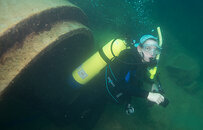"He said he wanted to see our how we responded to our impending change in buoyancy once we exited and the air in our BCs had expanded. "
This only makes it worse.
Scuba certification check-out dives are NOT "tests." They are to ensure students have mastered the skills already learned and to SAFELY familiarize you with a "real" diving environment - NOT to surprise you with a new challenge. The instructor's job is to
help you learn, not to see if you will fail some task.
What if the "change in buoyancy" sent two or three novice divers into an uncontrolled ascent? Someone could panic, embolize, and die.
This stinks of the bad old days of "Deep Dark and Dangerous," when egotistic instructors wanted everyone to see them as macho heroes. They would yank off our masks etc, "to see how we responded." That attitude went out with Richard Nixon and J-valves.
In my own Open Water checkouts, as well as in the pool, I repeatedly ask (sign) students "how much" air they have, and expect them to read their own gauges and report the remaining PSI. Thus I monitor them, and also ensure they monitor themselves by making it a regular habit.
Your instructor sounds like he needs a tune up.
---------- Post added October 13th, 2015 at 08:18 PM ----------
Well I am going to be the A?? here. So how many times did you show your gauge to the DI, Would he not tell you how much air you had. I mean the first time he would not tell me. I would had called the dive. You are the one that is to keep track of your air. Instead of looking to make the DI the bad guy ( and he is bad ). At this point you need to see what you could have done different so you did not run out of gas. Yes you are in a class. yes you are learning. yes the DI should have known how much air each student had. But you can not depend on other to do your job. That should be the very least to take away from this dive.
This disregards the fact that the OP is still a student.
It is a fact of human nature that new divers get tunnel vision from task loading and anxiety, etc. Training standards are intended to protect them from the consequences.
It is also a fact that regardless of any student's actions, in any matter, the Instructor remains fully and ultimately responsible for their safety.






